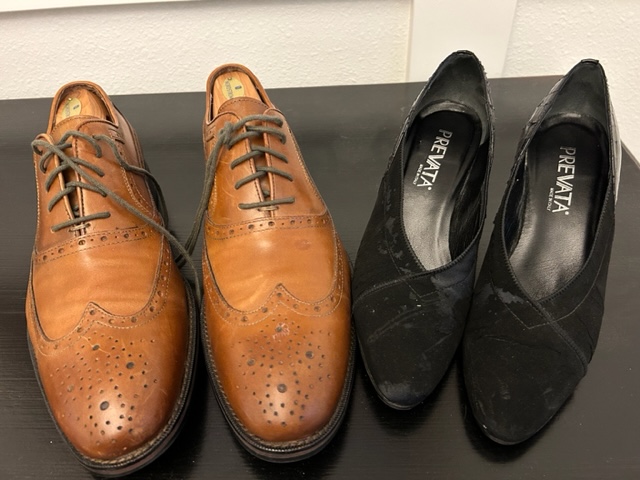Waiting for April

By Patricia Crisafulli
Note: I wrote this story in 2012. It came to mind just the other day and, with some revision, I’d like to share it here again
Night after night, the eastbound Glider pulled into Union Station just before nine o’clock and departed again at eleven, with such regularity that Thomas synchronized the end of his workday to it. Although he opened his shop promptly at eight in the morning, he never closed until he felt the rumble from the tunnels far below the ground floor. Not that the Glider brought him any business. No one on a coast-to-coast train came into the station for a shoeshine; the porters onboard did that for people with sleeping compartments. But like the movements of some cosmic clock, the train’s arrival marked his departure.
Tonight, the Glider, which operated with legendary punctuality, was late and Thomas wasn’t surprised. All day, he had felt his anxiety build with such intensity he vowed never to forget the date: Thursday, Nov. 17, 1953. There had been no reason for his uneasiness. Business was good all day. It had rained, and the rack of over-the-shoe rubbers had sold out, along with a dozen umbrellas. Such were the small pleasures in a 38-year-old bachelor’s life.
But now, as the minute hand inched toward nine with no sign or sound of the train, Thomas could hardly hit the nails straight as he replaced a heel on a shoe. There was no going home until he knew what happened to the Glider.
Then came the announcement: the Glider was expected at 9:25. Thomas waited for more, but when the announcement stopped, he had only his own musings to fill in the blank. A week before Thanksgiving, he thought; that could explain it. More travelers probably crowded on the Glider at the few stops it made: Los Angeles, Albuquerque, Kansas City, and Chicago for a two-hour layover, then Cleveland, Pittsburgh, and New York City.
Tired and hungry, he should head home and stop in the all-night diner on the way for something to eat. Yet he lingered in the doorway of the shop, hands on hips, surveying the slow trickle of people through the station. Most were men in gray flannel suits catching the late commuter trains to the suburbs. They’d probably stopped for a few on the way home but would tell their wives that they’d had a late meeting. How lucky they were, Thomas wanted to tell them, to have someone at home waiting. But nobody stopped in the Rise ‘N’ Shine Shoe Shoppe for advice. Bartenders were for that, he supposed.

The Great Hall reverberated with the announcer’s voice, as sonorous as a tenor in church: “The Glider is now expected to arrive at nine-forty-five due to mechanical troubles that have delayed it en route.” The announcer paused and Thomas gripped the edge of his workbench. “But never fear, the Glider will appear!”
Thomas blew out his cheeks. Nothing bad had happened, just some hiccups along the route. With that knowledge, he started to take off the heavy workman’s apron he wore over his clothes, then dropped his hands. If he left now the Glider might get hung up again, a thought he tried to dismiss, but couldn’t shake. He picked up a shoe that needed to be half-soled, telling himself the customer just might come back in the morning for it, although the ticket clearly promised Friday afternoon.
In the quiet of the station, Thomas heard singing and knew without looking who the voice belonged to, and called out to Brennan, the night custodian.
Brennan sang as he mopped, leaving a wide swath of dampness in front of the shuttered stores inside the station: the barber, the newsstand, the florist’s stall, and then the one that remained open, Thomas’s shop.
“I’m tired of the blues, March is over for me.
May holds no clues, it’s a mystery to me.
That’s why I’m waiting for April with my fingers crossed.
Waiting for April, so all is not lost…”
“Sure to be a Top Forty hit,” Thomas yelled out his front door. The song made no sense since this was the week before Thanksgiving. But the guy had a pretty good voice and a knack for making up lyrics that rhymed on the spot.
Brennan leaned on the handle; the cotton strands of the mop splayed like so much gray seaweed. “Been running through my head all day.”
The custodian picked up the tune and syncopated his stroke with it. Waiting for April, so all is not lost. Waiting for April, no matter the cost …

A rumble like distant thunder echoed through the station. The Glider’s first passengers came off with suitcases walking briskly since Chicago, the mid-point, was their destination. Thomas tried to picture himself as one of them, imagining someone at home pacing with anticipation for him; a sleepy-eyed child on the sofa trying hard to stay awake until he arrived. But when he was young, he’d been too shy with girls, and when he got older, most of the women his age had already married. The younger ones were looking for a man in a suit with a fancy car—not the guy who shined shoes.
Sadness started to well up again. He went back into the shop, humming Brennan’s stupid song to himself.
“Excuse me.” A woman’s voice called from the doorway.
Thomas turned, assessed quickly: Pretty, the other side of 25. Brown hair under a green felt hat.
“Is there a pharmacy here?”
Thomas knew every shop and doorway in a five-mile radius, but under the scrutiny of those dark eyes, he could not think of a single place. His mind cleared. “Are you sick? Do you need a doctor?”
“No, just a little indigestion.” She cast her eyes down to her feet.
Brown pumps, Naturalizers, he noticed. Had they been black and shiny with needle heels, he would have let her go. But here was a young woman in brown shoes, a little on the sensible side.
“Hold on,” Thomas called. “I got something.” He disappeared in the back, searched through drawers and then his coat pockets, and found the antacids. “Not sure how old they are, but they might help.”
The young woman took them gratefully and chewed slowly.
“You need some water?” Thomas asked. “They can be awfully chalky. Or how about coffee?”
“Oh, I don’t want to put you to any trouble,” she said. “Water would be fine.”
In the workroom, he washed a glass, rinsed it twice, and filled it with water. When he came back out, he didn’t see her at first, then spied her sitting on the low stool by the shoeshine chair.
As he handed her the glass, Thomas noticed how pale her hands were compared to his, stained from black and brown polishes rubbed into his skin as if he were made of tanned leather.
“Where’re you headed?” he asked.
“Home,” she replied. “I’ve been on the West Coast for a while, but I’m going home now.” She mentioned a place in New Jersey that he’d never heard of; her parents were expecting her.
Thomas heard the pauses between the words, no more than the occasional skipped beat. This wasn’t a pleasure trip, no visit to the relatives for Thanksgiving. But asking for details was not the polite thing to do, so he said the only thing he could think of: “Oh?”
She looked at him, then nodded. “I went out West because a girlfriend of mine had gone there. She’s an actress, had a couple of bit parts. I can’t sing or dance but thought maybe I could get a job behind the scenes. I became a secretary at one of the studios—a nobody working for a nobody who thought he was somebody.”
The young woman’s voice trailed off, and Thomas knew—that somebody turned out to be no good.
“The job ended. They fired me.”
“Why?” Thomas wished he’d said nothing when he saw the pained look in her eyes.
Her chin came up an inch. “Because my boss got me pregnant.”
Her words sucker punched him, and he had neither breath nor a response. He worked his jaw, as if practicing what to say and nearly gave up.
She looked away and started to get up from the stool.
“This is not your fault. A man ought to live up to his responsibilities!” Thomas spat out the words, more forcefully than he intended, and he saw the young woman blink in surprise.
She shrugged. “He was engaged to someone else. I was, well, on the side.”
This must be what bartenders experienced all the time, Thomas mused, being someone to listen, someone who would never be seen again. He studied the shoe polish stains on his hands. “Well, it’s good you’re going home to your family. They’ll help you figure it all out.”
“They don’t know,” she added. “They think I’m coming home for Thanksgiving.”
The announcer’s voice cut the stillness of the station, announcing the Glider’s departure was being delayed until 12:30 due to mechanical difficulties. Thomas glanced at his watch: 10:18.
“I should let you go,” the young woman said. “You must be tired, and your family is waiting for you.”
Underneath his work apron as thick and heavy as a rhinoceros hide, Thomas felt the gallop of his heart. He could sit with this young woman, keep her company until she had to reboard the train.
“Nobody’s waiting for me.”
He watched her posture relax as she settled back onto the stool. “Listen, if you’re hungry, I know a place, not far from here. I’ll have you back long before 12:30.”
Uneasiness flickered in her eyes.
“Oh, you don’t have to worry. My name is Thomas—Thomas Byrne. I own this shop. You can ask any conductor in this station about my reputation. I’m a good man and I have no bad intentions.”
“I know that.” She got to her feet. “I’ll need to get my coat from the train.”
“Take mine.” Thomas fetched his black and gray tweed overcoat from the backroom and put it around her shoulders. He saw his reflection in the mirror against the back wall: dark hair, touch of gray, a plain face if there ever was one. “By the way, you didn’t tell me your name.”
“April—April Sawyer.”
Thomas dropped his ring of keys, and his head swam as he stooped to retrieve them. “Your name is April?”
She smiled. “I was born in August, so don’t ask me how I got that name. My mother liked it, I guess.”
On the five-minute drive to the diner, Thomas only half-listened to April’s stories of back home: her older sister who was married and had two children; a younger brother in the service; her father, a school principal; her mother, a member of the Garden Club and the Ladies Home & Aid Society. As she talked, all he could hear was Brennan’s stupid song, wondering if it had been a sign somehow, that this was his chance: him, a 38-year-old bachelor in Chicago and her, a 26-year-old pregnant woman on a train from California bound for the East Coast.

Normally Thomas sat at the counter, but tonight he took a booth. Connie, the waitress, saw him with April and gave him a twinkling-eyed smile. He ordered the meatloaf special; April wanted chicken salad.
Halfway through the meal, Thomas put down his fork, unable to take another bite until he moved the boulder out of his chest, the one composed of every word he’d never spoken in his life out of shyness, nervousness, or fear of making a fool of himself. “April, do you have to leave on the train tonight?”
She stared at her lap for a long time. Thomas feared the worst over her silence but plunged ahead. “Suppose you spend a couple of days in Chicago, just to get your bearings. I know a little guest house not far from here—nice and clean. Not expensive. You might want to think things over.”
Tears rolled down her cheeks. April showers, Thomas thought, and knew instantly that’s what he would forever call them.
“I don’t want to go home to my parents. I just don’t have any place else to go.”
Thomas paid the check and ushered April out of the diner.
Back at the shop, he looked up the number to the guest house, rang the phone long enough to wake the proprietor, whom he knew, and told him a young lady had arrived on the Glider and needed a room. “Free shoeshine in it for you, Fred,” Thomas laughed. The man agreed, and Thomas accompanied April to the train to fetch her bags.
The conductor eyed him slyly when April said she was staying in Chicago for a few days. Thomas looked away, embarrassed by the implication, but didn’t care what anybody thought.

Thanksgiving approached. April called her family from a payphone, reversing the charges. Her mother cried, her father threatened to come to Chicago to bring her home.
A week after that, she and Thomas stood up before the justice of the peace. She moved into Thomas’s apartment and came with him to the shop, waiting on the regular customers whose eyes gaped when they saw his gold wedding band that matched hers.
Every time someone remarked about it, Thomas slipped his arm around her shoulders. “When the right girl came along, I didn’t waste any time.”
Thomas made the next phone call to New Jersey while April stood beside him, wringing her hands until her skin reddened. Her father talked about annulment and said he was coming to get her.
April grabbed the phone, “I’m pregnant.”
Taking back the receiver, Thomas bore the brunt of April’s father’s wrath, never letting on that he wasn’t the one to blame. Never would he divulge anything April had told him.
This child would never know anything different other than Thomas was his father. Nor would any of the other children who came along in time for surely, Thomas knew, they would be a family.
Nothing mattered, except that he had waited for April.


